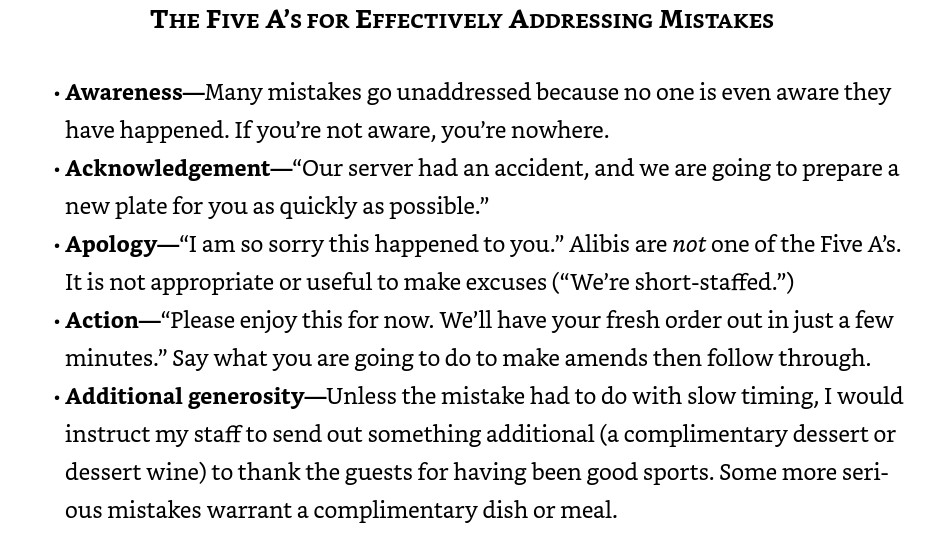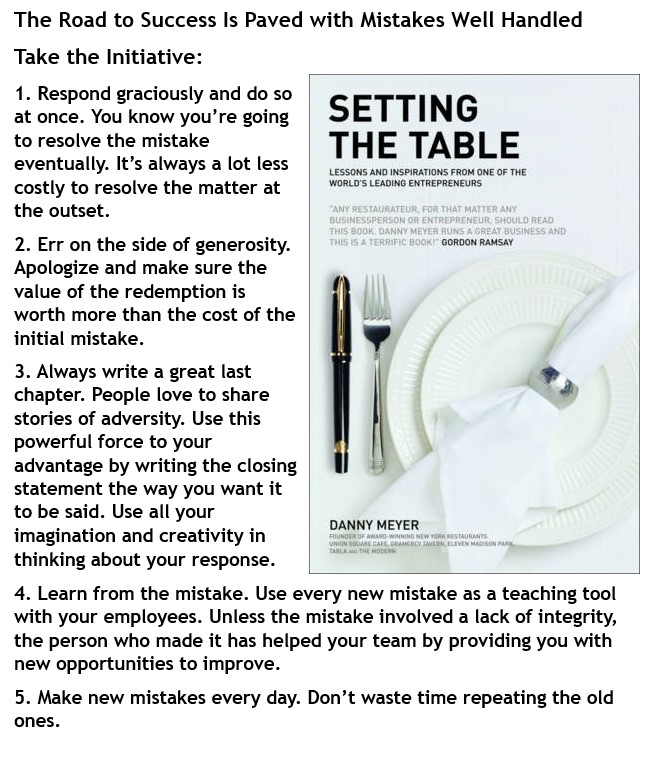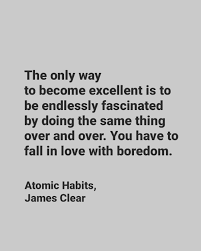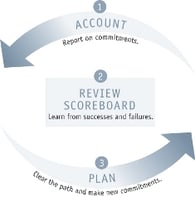Shit happens! "C'est la vie"
You may have heard this expression. Life is full of unfortunate unpredictable events.
How you respond to mistakes will probably determine the success or failure of your business.
This is like Business 101. If mistakes are going to happen, wouldn’t it make sense to create a system for how your team responds to mistakes?
The Road to Success Is Paved with Mistakes Well Handled
In September of 1994, Danny Meyer met Stanley Marcus, whose family had founded Neiman Marcus in Dallas in 1907, and admitted to him he thought he had made a mistake by opening Gramercy Tavern that July. Stanley Marcus’ response changed how Meyer looked at mistakes. Marcus said to Meyer, “So you made a mistake. You need to understand something important. And listen to me carefully: The road to success is paved with mistakes well handled.
Meyer recalled his grandfather Irving Harris telling him, “The definition of business is problems.” His philosophy was, “Success lies not in the elimination of problems but in the art of creative, profitable problem-solving. The best companies are those that distinguish themselves by solving problems most effectively.”
Business is Problem Solving.
If you own and run a business, you probably started it either to solve consumer problems or to solve them better than what previously existed. You thought you had a better mouse trap.
We all make mistakes. The worst mistake is not to figure out some way to end up in a better place after having made a mistake. At Union Square Hospitality Group, they call this, “writing a great last chapter.”
You can’t erase what happened. You do have the power to write one last episode, so the story ends the way you want.
To be effective, Meyer has found, the last chapter must be written imaginatively, graciously, generously, and sincerely.
He’s also found that when you acknowledge a mistake and genuinely express your regret at having made it, guests will almost always give you a chance to earn back their favor.
Here are Danny Meyer's Five A’s for effectively addressing mistakes.

Watch Danny Meyer share a remarkable mistake with a Hot Dog for a six-year-old boy at Shake Shack, and how they turned it into “a great last chapter.”
MRM News--Danny Meyer on Turning Mistakes Around
Time Frame and Initiative
Something many entrepreneurs and business owners miss when they’ve made a mistake is the time frame and initiative to correctly respond to a mistake. Meyer notes, “When something goes wrong, it is essential for the manager on whose watch the mistake occurred to make every effort to connect with the guest within twenty-four hours.”
They also immediately review and analyze our own performance to determine exactly what happened. Meyer likes to get the story first from his people. Why? Because he feels his first responsibility in the culture of enlightened hospitality is to be on the side of our team.
Then he asks for the customer’s version.
His insights are worthy of note:
If a complaint involves a server’s “bad attitude,” we will find out exactly what took place and then use that knowledge to help the staff member learn from what happened.
(Sometimes we learn that guests bring in their own bad attitude. In that case, there’s still an opportunity to learn about how to respond more effectively to a guest’s challenging mood.)
If a server repeats the same mistakes—a second or third spill, a pattern of complaints about his or her attitude—then we may need to address that person’s overall ability to excel or comply with our priorities.
Danny Meyer's five steps to take initiative on mistakes can be applied to any business:

In it for Keeps?
Meyer’s question is worth sharing. “Are you in it for keeps? It’s almost always worth bearing a higher short-term cost if you want to win in the long run. I’m convinced that you get what you give, and you get more by first giving more. Generosity of spirit and a gracious approach to problem-solving are, with few exceptions, the most effective way I know to earn lasting goodwill for your business.
There’s always a solution if you’re open to finding one.”
Need help to build your culture and systems for your business?
To create an environment where everyone is inspired to give their best, contact Positioning Systems today to schedule a free exploratory meeting.
Growth demands Strategic Discipline.
 Why is success so difficult? James Clear, author of Atomic Habits, may have the answer. Think about success. How do companies become successful? Clear believes it's by falling in love with boredom. Let’s explore this in our next blog.
Why is success so difficult? James Clear, author of Atomic Habits, may have the answer. Think about success. How do companies become successful? Clear believes it's by falling in love with boredom. Let’s explore this in our next blog.
Building an enduring great organization requires disciplined people, disciplined thought, disciplined action, superior results, producing a distinctive impact on the world.
Discipline sustains momentum, over a long period of time, laying the foundations for lasting endurance.
 A winning habit starts with 3 Strategic Disciplines: Priority, Metrics, and Meeting Rhythms. Forecasting, accountability, individual, and team performance improve dramatically.
A winning habit starts with 3 Strategic Disciplines: Priority, Metrics, and Meeting Rhythms. Forecasting, accountability, individual, and team performance improve dramatically.
Meeting Rhythms achieve a disciplined focus on performance metrics to drive growth.
Let Positioning Systems help your business achieve these outcomes on the Four most Important Decisions your business faces:
|
DECISION |
RESULT/OUTCOME |
|
PEOPLE |
|
|
STRATEGY |
|
|
EXECUTION |
|
|
CASH |
|
Positioning Systems helps mid-sized ($5M - $500M+) businesses Scale-UP. We align your business to focus on Your One Thing! Contact dwick@positioningsystems.com to Scale Up your business! Take our Four Decisions Needs Assessment to discover how your business measures against other Scaled Up companies. We’ll contact you.
NEXT BLOG – Falling in Love With Boredom






.jpeg?width=150&height=135&name=Hand%20with%20marker%20writing%20the%20question%20Whats%20Next_%20(1).jpeg)

